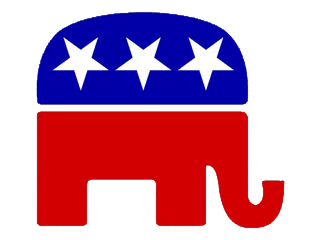It was the chief environmental narrative of the 2010 midterm elections. The field of Republican Senate and House challengers, charged bloggers, were a bunch of “climate zombies.” Tea Party backed insurgents were knocking off GOP moderates who took climate science seriously—like Delaware’s Mike Castle—and it was becoming harder and harder to find a good Republican who did accept the scientific consensus on climate change.
Then, when Republicans swept into the House of Representatives, fears about the party’s denialist tendencies compounded further. There was word of “ClimateGate” hearings, aimed at prying loose additional emails and documents from mainstream global warming researchers. Whether or not such hearings actually take place, a vision of today’s U.S. Republican Party as monolithically in denial about what we’ve been doing to the planet has clearly taken root.
It was all, apparently, more than the stalwart Republican moderate Sherwood (“Sherry”) Boehlert could take. 
Taking to the Washington Post oped page, Boehlert challenged fellow Republicans to step back from the brink of extremism. He called upon his political brethren “to open their minds to rethinking what has largely become our party’s line: denying that climate change and global warming are occurring and that they are largely due to human activities.”
Boehlert didn’t disupte that today’s GOP is overwhelmingly out of touch with established knowledge about the core problem facing our planet. However, he did try to argue that this dismaying development was of relatively recent vintage. At the close of the oped, Boehlert called upon Republicans to be much more like Ronald Reagan, who
Here’s where our story grows rather sad. Well intentioned as he is, Boehlert is himself in denial about just how bad the Republican Party’s record is on science and the environment, and how far back it goes. Ronald Reagan was no representative of some better era. On the contrary, and as I argued in my book The Republican War on Science, he’s pretty much where the problem started.
Dwight Eisenhower, the celebrated Republican president, was a huge booster of science and research. He created the office of the president’s science adviser and manned the U.S.’s response to the Soviet launch of Sputnik. Ike’s answer? Ramp up the country’s scientific capacity. The bipartisan tradition of supporting science that began with Eisenhower carried on through the Nixon era, when a Republican president presided over the establishment of the Environmental Protection Agency and the passage of many landmark environmental laws.
But Ronald Reagan is where it all changed. His presidency marked a decisive turn toward a Republican electoral strategy that drew upon the religious right base (then called the “Moral Majority”) and corporate interests. These constituents had beefs with science in multiple areas, and Reagan’s administration catered to them again and again.
On the campaign trail, Reagan supported teaching creationism in public schools. As president, he failed to acknowledge the AIDS epidemic until near the close of his second term. And on environmental science, his administration was atrocious. On the environmental issue most prominent at the time—acid rain—Reagan dragged his feet until 1986 before copping to the scientific consensus that it was being caused by human activities. Then he ran out the clock without taking any action to rein it in—just like George W. Bush did on climate change.
There were many other transgressions: Reagan appointed the anti-environmentalists James Watt and Anne Gorsuch (later Burford) to head the Interior Department and Environmental Protection Agency. At the latter, a “hit list” was uncovered of scientists who were deemed too liberal. Dealing with the problem of CFCs was indeed an environmental bright spot for the Reagan administration, but they were few and far between.
Poor Sherry Boehlert. On the one hand, his example proves that Republicans today can still support mainstream climate science. The issue will never be 100 percent partisan until there isn’t a single Republican who cuts against the grain, and with old school moderates like Boehlert around, that will never happen.
Nevertheless, the issue is overwhelmingly partisan, as we can see both from the composition of Congress, and also from polling data showing that political party affiliation is a leading predictor of a person’s views on global warming in the U.S.
Furthermore, we are where we are today because of a long history in which the U.S. Republican Party has drifted farther and farther away from the scientific community. That history starts with the party’s icon, Ronald Reagan, and proceeds through many other party leaders up to the present.
So just how partisan is global warming denialism? At this point, the answer is: very. And how much does that have to do with our failure to address the problem? A lot.
Subscribe to our newsletter
Stay up to date with DeSmog news and alerts







